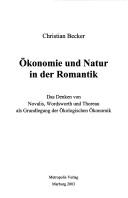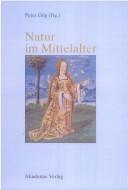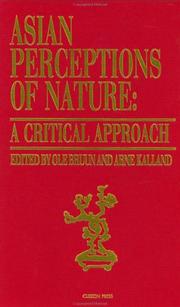| Listing 1 - 10 of 11 | << page >> |
Sort by
|
Book
ISBN: 9783899429442 Year: 2009 Publisher: Bielefeld : Transcript,
Abstract | Keywords | Export | Availability | Bookmark
 Loading...
Loading...Choose an application
- Reference Manager
- EndNote
- RefWorks (Direct export to RefWorks)
Gesellschaft. --- Gesellschaft. --- Kultur. --- Naturlandschaft. --- Naturverständnis. --- Naturverständnis. --- Geschichte.
Book
ISBN: 3412503592 3412506303 9783412503598 9783412506308 Year: 2016 Publisher: Köln : Böhlau,
Abstract | Keywords | Export | Availability | Bookmark
 Loading...
Loading...Choose an application
- Reference Manager
- EndNote
- RefWorks (Direct export to RefWorks)
Naturverständnis. --- Naturwissenschaften. --- Rezeption. --- Goethe, Johann Wolfgang von,
Book
ISBN: 9783037346365 3037346361 Year: 2016 Publisher: Zürich : Diaphanes,
Abstract | Keywords | Export | Availability | Bookmark
 Loading...
Loading...Choose an application
- Reference Manager
- EndNote
- RefWorks (Direct export to RefWorks)
Der 'Animismus' ist eine Erfindung der Ethnologie des 19. Jahrhunderts, geprägt auf dem Höhepunkt des europäischen Kolonialismus. Animisten bevölkern die unbelebte Natur mit Seelen und Geistern. Das erklärt man als eine die materielle Realität verkennende 'Projektion', durch die den Dingen und der Natur Leben und Handlungsmacht zugeschrieben wird. Animismus wird so zum Gegenbild moderner Wissenschaft, zum Ausdruck eines 'Naturzustands', in dem Psyche und Natur als ungeschieden gelten. Wenn sich letzthin ein neues Interesse am Animismus herausgebildet hat, liegt das nicht daran, dass der Begriff als wissenschaftliche Kategorie rehabilitiert wurde. Vielmehr ist die kategorische Trennung von subjektiver und objektiver Welt selbst in Bewegung geraten.
Animismus. --- Begriff. --- Erkenntnistheorie. --- Fremdheit. --- Kulturanthropologie. --- Moderne. --- Naturverständnis. --- Soziale Konstruktion. --- Ästhetik.
Book
ISBN: 3770551036 9783770551033 Year: 2011 Publisher: Paderborn : Fink,
Abstract | Keywords | Export | Availability | Bookmark
 Loading...
Loading...Choose an application
- Reference Manager
- EndNote
- RefWorks (Direct export to RefWorks)
Naturerlebnis. --- Naturverständnis. --- Naturwissenschaften. --- Goethe, Johann Wolfgang ((von)). --- Goethe, Johann Wolfgang von,

ISBN: 389518439X 9783895184390 Year: 2003 Publisher: Marburg : Metropolis,
Abstract | Keywords | Export | Availability | Bookmark
 Loading...
Loading...Choose an application
- Reference Manager
- EndNote
- RefWorks (Direct export to RefWorks)
Environmental economics. --- Menschenbild. --- Naturverständnis. --- Romanticism. --- Umweltökonomie. --- Wirtschaftstheorie. --- Novalis, --- Novalis. --- Thoreau, Henry David, --- Thoreau, Henry David. --- Wordsworth, William, --- Wordsworth, William, --- Criticism and interpretation. --- Criticism and interpretation. --- Criticism and interpretation.
Book
ISBN: 1281993263 9786611993269 3110209691 9783110209693 3110195658 9783110195651 9781281993267 6611993266 Year: 2008 Publisher: Berlin New York Walter de Gruyter
Abstract | Keywords | Export | Availability | Bookmark
 Loading...
Loading...Choose an application
- Reference Manager
- EndNote
- RefWorks (Direct export to RefWorks)
Nature is not only stable and static but also unstable and dynamical ? this has been shown by physics during the last 40 years. Today, instabilities are regarded as productive and creative sources of change, pattern formation, and growth. They constitute the nomological nucleus of self-organization, chaos and complexity, time's arrow and chance. This change in understanding nature has also modified sciences. Physics has traditionally limited its scope to stability. Currently, it is expanding and renewing itself: a late-modern physics is emerging, and discloses rich interdisciplinary perspectiv
Nonlinear theories. --- Physics --- Stability. --- Dynamics --- Mechanics --- Motion --- Vibration --- Benjamin-Feir instability --- Equilibrium --- Nonlinear problems --- Nonlinearity (Mathematics) --- Calculus --- Mathematical analysis --- Mathematical physics --- Philosophy. --- Physics - Philosophy. --- Physics - History. --- Instability. --- complexity. --- philosophy. --- physics. --- self-organization. --- Instabilität. --- Naturphilosophie. --- Naturverständnis. --- Philosophie. --- Physik. --- Wissenschaftsentwicklung. --- History.
Book
ISBN: 3110663813 3110663805 Year: 2020 Publisher: Düsseldorf : düsseldorf university press,
Abstract | Keywords | Export | Availability | Bookmark
 Loading...
Loading...Choose an application
- Reference Manager
- EndNote
- RefWorks (Direct export to RefWorks)
Against the background of demographic change, recession, the Tōhoku triple disaster in 2011, and the discourse on environmental protection, Japan’s regions have once again become the focus of attention. This volume deals with current developments and problems in the revitalization of Japan’s rural regions and discusses representations and (re-)constructions of nature, land, and ruralism. Im Zuge des demografischen Wandels und der ökonomischen Rezession, der Tōhoku-Dreifachkatastrophe im Jahr 2011 sowie des Diskurses um Natur- und Umweltschutzkonzepte sind Japans Regionen wieder verstärkt ins Zentrum der Aufmerksamkeit gerückt. Bilder des ländlichen Japans dienen als nostalgischer Zufluchtsort und Projektionsfläche urbaner Sehnsüchte. Tatsächlich sind die Regionen oft mit Problemen, wie Bevölkerungsschwund, Strukturschwäche und Überalterung, konfrontiert. Initiativen zur Revitalisierung versuchen, diesen Herausforderungen zu begegnen. Aus der Ambivalenz zwischen Idylle und Verfall generieren sich neue subnationale, lokale und regionale Selbstbilder, die mitunter einen Gegenpol zur Positionierung der japanischen Regierung bilden. Der zweite Band der Reihe „Kultur- und Sozialwissenschaftliche Japanforschung" beschäftigt sich mit gegenwärtigen Entwicklungen in Japans Regionen. Anhand aktueller sowie historischer Fallbeispiele diskutieren die Autorinnen und Autoren, welchem sozialen, politischen und wirtschaftlichen Zweck Repräsentationen und (Re-)Konstruktionen von Natur, Nation und Ländlichkeit dienen.
Grüner Tourismus. --- Japan. --- Japanese landscapes. --- Japan’s periphery. --- Ländlicher Raum. --- Naturverständnis. --- Regional Japan. --- Revitalisierung. --- Stadt-Land-Migration. --- furusato. --- revitalization projects. --- rural regions of Japan. --- satoyama. --- urban-rural migration. --- SOCIAL SCIENCE / General.

ISBN: 3050037784 9783050037783 Year: 2003 Publisher: Berlin : Akademie Verlag,
Abstract | Keywords | Export | Availability | Bookmark
 Loading...
Loading...Choose an application
- Reference Manager
- EndNote
- RefWorks (Direct export to RefWorks)
Cosmologie médiévale --- Cosmology, Medieval --- Cosmology, Medieval. --- Kongress. --- Naturerkenntnis. --- Naturverständnis. --- Philosophie de la nature --- Philosophie médiévale --- Philosophy of nature --- Philosophy of nature. --- Philosophy, Medieval --- Philosophy, Medieval. --- Histoire --- History --- Geschichte 500-1500. --- Geschichte 500-1500.
Book
ISBN: 9780226212364 9780226144450 0226144453 022621236X Year: 2013 Publisher: Chicago ; London : The University of Chicago Press,
Abstract | Keywords | Export | Availability | Bookmark
 Loading...
Loading...Choose an application
- Reference Manager
- EndNote
- RefWorks (Direct export to RefWorks)
"Successor to Claude Levi-Strauss at the College de France, Philippe Descola has become one of the most important anthropologists working today, and Beyond Nature and Culture has been a major influence in European intellectual life since its French publication in 2005. Here, finally, it is brought to English-language readers. At its heart is a question central to both anthropology and philosophy: what is the relationship between nature and culture? Culture - as a collective human making, of art, language, and so forth - is often seen as essentially different than nature, which is portrayed as a collective of the nonhuman world, of plants, animals, geology, and natural forces. Descola shows this essential difference to be, however, not only a specifically Western notion, but also a very recent one. Drawing on ethnographic examples from around the world and theoretical understandings from cognitive science, structural analysis, and phenomenology, he formulates a sophisticated new framework, the "four ontologies"--Animism, totemism, naturalism, and analogism - to account for all the ways we relate ourselves to nature. By thinking beyond nature and culture as a simple dichotomy, Descola offers nothing short of a fundamental reformulation by which anthropologists and philosophers can see the world afresh"--provided by publisher.
Philosophy of nature --- Human ecology --- Philosophy of nature. --- Human ecology. --- #SBIB:17H11 --- #SBIB:1H30 --- Ecology --- Environment, Human --- Human beings --- Human environment --- Ecological engineering --- Human geography --- Nature --- Nature, Philosophy of --- Natural theology --- Menselijke natuur en morele voorschriften --- Filosofie van de mens, wijsgerige antropologie --- Social aspects --- Effect of environment on --- Effect of human beings on --- Philosophy --- Kultur. --- Kulturelle Entwicklung. --- Kulturvergleich. --- Mensch. --- Natur. --- Naturphilosophie. --- Naturverständnis. --- Weltbild.

ISBN: 0700703012 9780700703012 0700702903 9780700702909 9781315026138 9781136777769 9781136777837 Year: 1995 Publisher: Londres Curzon Press
Abstract | Keywords | Export | Availability | Bookmark
 Loading...
Loading...Choose an application
- Reference Manager
- EndNote
- RefWorks (Direct export to RefWorks)
42.90 ecology: general. --- Environmental policy --- Environmental policy. --- Environnement --- Mens en natuur. --- Milieugedrag. --- Naturbetrachtung. --- Nature conservation --- Nature conservation. --- Nature worship --- Nature worship. --- Nature --- Naturgefühl. --- Naturverehrung. --- Naturverständnis. --- Philosophie de la nature --- Philosophy of nature. --- Politique de l'environnement --- Écologie humaine --- Protection --- Culte --- Asia. --- Asien.
| Listing 1 - 10 of 11 | << page >> |
Sort by
|

 Search
Search Feedback
Feedback About UniCat
About UniCat  Help
Help News
News